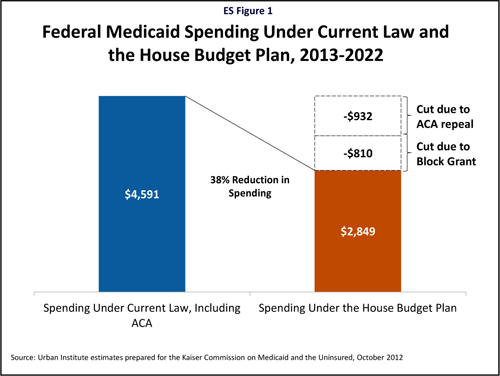
The House Republican plan to repeal President Barack Obama’s health law and turn Medicaid into a block grant program would save the federal government $1.7 trillion from 2013 to 2022, a 38-percent spending reduction, according to a report today by the Urban Institute for the Kaiser Family Foundation.
It would also result in 31 million to 38 million fewer people getting Medicaid coverage in 2022, according to the report. The entitlement program, which is jointly financed by the state and federal governments, now provides health coverage to about 62 million poor people, about half of whom are children.
The block grant idea – paying a fixed sum to states — was formulated by Rep. Paul Ryan, Mitt Romney’s vice presidential running mate and chair of the House Budget committee, and passed by the Republican-controlled House of Representatives in 2011 and 2012. The strategy is part of the GOP plan to cut the nation’s $1 trillion federal deficit.
Romney backs a similar Medicaid block grant strategy that would cut $100 billion a year from Medicaid starting in 2013. Under Romney’s plan, federal payments to the states for Medicaid would grow at 1 percentage point a year above the Consumer Price Index. That would slow funding increases, but give states greater freedom in how they use the money, including the ability to cut eligibility or benefits to meet their budget needs. Today, the federal government sets minimum rules and guidelines and must approve any major changes to the program.
The Urban Institute analysis, which updates an analysis originally done in May 2011, said the House block grant plan would cut funding to hospitals by as much as $363.8 billion, and payments to nursing homes by $22.2 billion.
Of the $1.7 trillion cut to Medicaid spending, $932 billion of the reductions come from repealing the Medicaid expansion in Obama’s health law and $810 billion is a result of spending cuts that are part of the block grant.
Under the health law, Medicaid would expand to cover as many as 17 million more people starting in 2014. States have the option to decide whether to expand eligibility, and several Republican-led states including Florida and Texas say they can’t afford the expansion.






